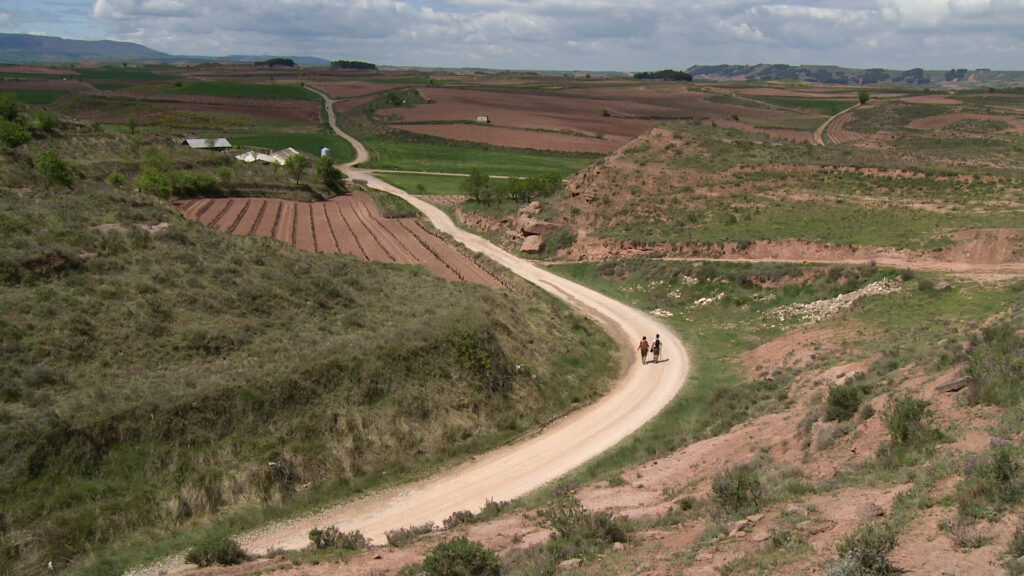For a lot of modern walkers, the Camino de Santiago (the Way of St. James) provides simply a vacation – a chance to exercise, get away from technology, eat well and explore the beautiful European countryside. For others, it is a pilgrimage of challenge and achievement, observing a landmark birthday or major event like retirement. For many, though, the pilgrimage is a quest for faith and spiritual growth.
I have been a widow for four years. The Camino, a large network of ancient pilgrim routes stretching across Europe and coming together at the apostle’s tomb in northwest Spain, seemed the perfect place to let go of grief, to honor the life I once had and celebrate the new one I’ve been given. I researched the various ways to approach the trip and settled on a pilgrimage sponsored by The Compass, newspaper of the Diocese of Green Bay, Wis., last May.
I chose it over other options because I wouldn’t have to carry anything except my daypack while walking, and I had a guaranteed bed in a clean hotel every night. I hardly noticed the other details, like an inspiring spiritual director, daily Mass, traditional prayer opportunities and a grand finale of two days in Fatima.
Relinquishing grief is not an easy task, and on the trail, it caught me off guard. It hurt when I saw landscapes Neil would have enjoyed or thought of jokes only he could understand. I was jealous when I saw couples sharing whispered private moments or holding hands. And I was overwhelmed by the fleetingness of life as I walked where thousands of other pilgrims had gone before me over hundreds of years.
Not surprising then, I didn’t successfully leave my grief behind on the Camino. It didn’t end up buried in the Eucalyptus forest or hung on a mile marker like the many pairs of well-worn sneakers left by previous pilgrims. In fact, I gathered up even more as my wounded heart made me empathetic to others suffering pain and loss – and there were many.
I felt the aching of the elderly Spanish woman working alone in her fields in the midafternoon sun.
I felt the disappointment of the pilgrims whose dreams of finishing were ruined by injuries like falls and swollen, blistered feet.
I felt the despair of the young man who confessed he had never had an experience of God but was still waiting.
I felt the grief of other pilgrims who lost parents, children, spouses:
“My mom died nine months ago.”
“My husband died on a walk in the woods one day on his lunch break.”
“I lost a child.”
“My dad died from dementia last month, right after my mom died from the same thing.”
Not only did we share blisters and beautiful vistas, we shared pain. The added grief felt heavy, even though I’d surely lost weight on the journey and carried only the most essential items in my backpack.
It wasn’t until our pilgrimage arrived in Fatima that things changed. I could feel the presence of our Blessed Mother, who knew pain as well as any of us feel it. I could sense her reassuring spirit in the village of the three little shepherds and the outdoor Stations of the Cross.
Finally, in the nighttime candlelight rosary procession, with people speaking different languages but carrying matching flames, I watched the smoke float toward heaven and felt my heaviness rise with it.
As I reflect on the experience, I see God’s hand at work. He wanted me to be part of this special group. He wanted me to be touched by these people, to share my story and hear theirs. He wanted me to feel his presence in the kindness of strangers, the call of a cuckoo bird, the smell of the Eucalyptus groves and the sense of the ancients walking beside me.
He wanted me to experience the gift of Fatima and the comfort of his mother. And he was there with me the whole way, blessing my blistered feet as my grief finally lessened.
Our world is a broken, wounded place, but it is also a world of joy and delight, filled with the presence of God. I know my grief will return at every anniversary and birthday and even at unexpected moments when I am not prepared.
However, with God’s faithful presence and Mary’s intercession, my heart can be light, and I can continue joyfully to the ultimate destination of my life’s pilgrimage.
Colleen Arnold is a physician, writer and a member of St. Patrick Parish, Lexington.

